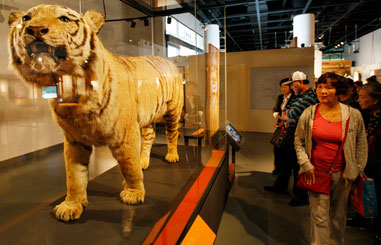VR's significance in media set to grow, say experts
Do you sometimes picture yourself swimming with whales or mingling with celebrities in a party setting?
The 2016 Global Video Media Forum, held in Suzhou, East China's Jiangsu province, over Oct 20-21, told us that a digital revolution underway could bring us close to our fantasies. More than 300 participants from 36 countries and regions came to the forum, which was hosted by CCTV News Content, a first of its kind video agency that serves hundreds of TV stations in China and outside.
Visitors at the event wore virtual reality headsets and "swam" in oceans or "flew" in a helicopter through glass windows.
VR might become a means to report news as well as live stream videos in the future, according to some experts at the forum.
"VR connects the audience to news spots. It transports viewers to the scene of action, which more easily resonates with them," says Liu Qun, head, strategic investment, CCTV.com.
State-owned CCTV.com, for example, has produced a VR program about the Red Army's Long March. The program allows viewers to "walk" with the Communist troops on their tough journey undertaken from 1934 to 1936, while trying to avoid being encircled by the Kuomintang forces.
Jessica Sander, a multimedia design manager with The New York Times, says while VR might not replace traditional news reporting, it could make people know the world better.
"VR makes you go to another place that you normally won't visit. Just like joining the refugees in The Displaced to see where they're living," says Sander.
The Displaced is a 11-minute VR film chronicling the global refugee crisis following the views of three displaced children in Lebanon, South Sudan and Ukraine, made by NYT magazine.
But not all content is suitable for VR, says Salar Shahna, creative director and co-founder of World VR Forum, a Swiss association dedicated to advancing the VR industry, pointing to ethical considerations that need to be made while selecting news for viewers.
He also says VR's biggest significance lies in that it can change the viewer's identity in a virtual environment, "make you become anyone that you want to be".
Many see 2016 as a year of VR boom and rise in live streaming.
Gao Wei, managing director of CCTV News Content, says video is changing the world, and in the near feature video will become a major way to communicate and receive information.
"China will reportedly have a 5G network, which means the internet speed can be as fast as downloading 10 high-quality films in the blink of an eye," he says.
Nikolaus Lohmann, CEO, Earth TV, a German channel, says live video streaming will in some ways dominate the information highway.
"You can be on the other side of the world, or even not know a language," he says. "Image is universal."
Earth TV airs live broadcasts around the world, and Lohmann says he is seeking Chinese media partners to showcase Chinese cities.
Research shows the human attention span is about eight seconds, which means video can grab eyeballs quicker than text or still images, says David Schlesinger, managing director, Triod Advisors, a Hong Kong-based company providing consultancy to media and business.























